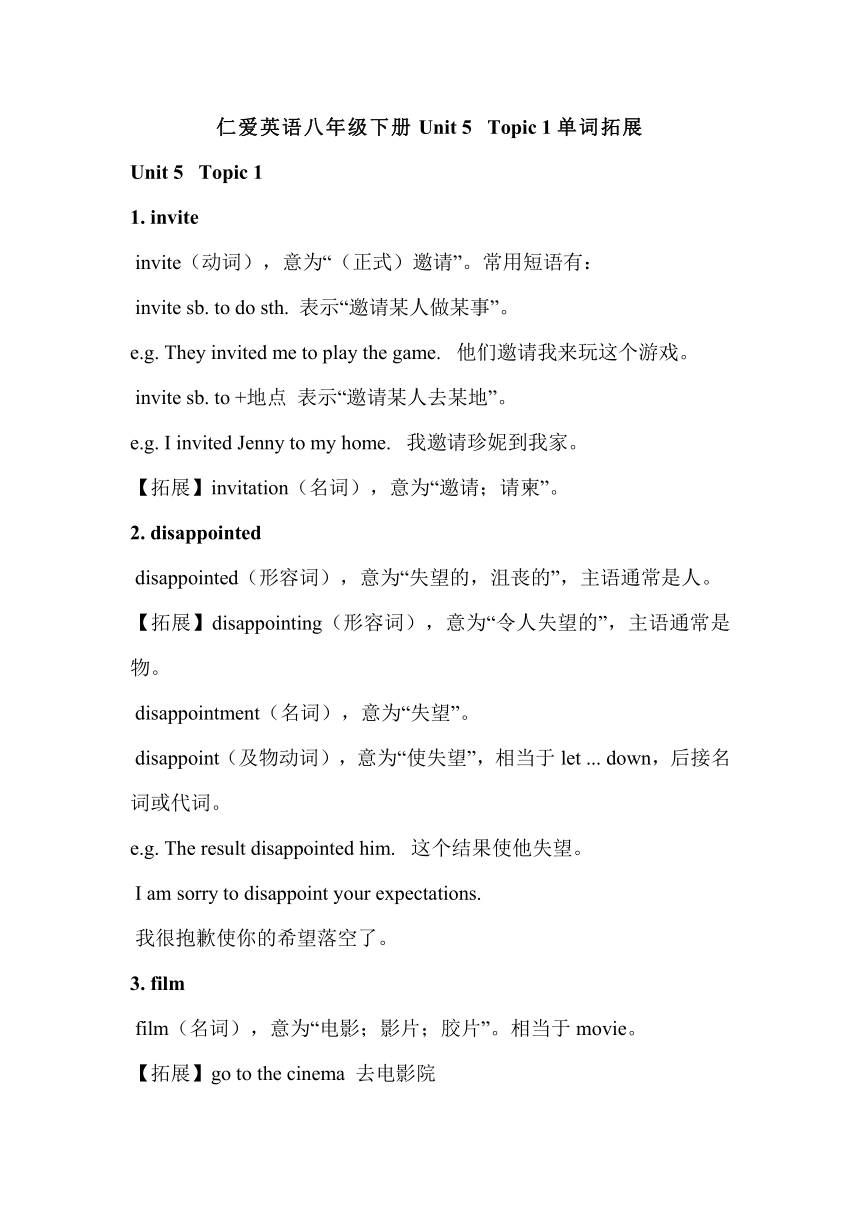
仁爱英语八年级下册Unit 5 Topic 1单词拓展 Unit 5 Topic 1 1. invite invite(动词),意为“(正式)邀请”。常用短语有: invite sb. to do sth. 表示“邀请某人做某事”。 e.g. They invited me to play the game. 他们邀请我来玩这个游戏。 invite sb. to +地点 表示“邀请某人去某地”。 e.g. I invited Jenny to my home. 我邀请珍妮到我家。 【拓展】invitation(名词),意为“邀请;请柬”。 2. disappointed disappointed(形容词),意为“失望的,沮丧的”,主语通常是人。 【拓展】disappointing(形容词),意为“令人失望的”,主语通常是物。 disappointment(名词),意为“失望”。 disappoint(及物动词),意为“使失望”,相当于let ... down,后接名词或代词。 e.g. The result disappointed him. 这个结果使他失望。 I am sorry to disappoint your expectations. 我很抱歉使你的希望落空了。 3. film film(名词),意为“电影;影片;胶片”。相当于movie。 【拓展】go to the cinema 去电影院 go to cinema go to the movies go to the film 去看电影 4. smell smell(动词),意为“发气味;闻(到),嗅(到)”。 smell(名词),意为“气味”。 【拓展】感官动词: look看起来 sound听起来 feel感觉起来 taste尝起来 5. seem seem(连系动词),意为“似乎,好像”。后接形容词作表语,可以和seem to be互换。 e.g. He seems very angry. = He seems to be very angry. 他好像非常生气。 【拓展】seem的用法归纳: ① seem + 名词 e.g. He seems a nice man. 他看起来是个好人。 ② seem like ... 意为“好像/似乎......” e.g. It seemed like a good idea at the time. 当时这主意好像不错。 ③ It seems/ seemed that ... 意为“看起来好像......,似乎......”。 e.g. It seemed that he was very happy. 他看上去好像很高兴。 ④ seem to do sth. 意为“似乎/看来/好像做某事”。 e.g. I seem to leave my book at home. 我好像把书忘在家里了。 ⑤ seem to be + 名词或形容词,意为“看起来好像.....,似乎......”。 e.g. She seems to be very happy. 她看起来很高兴。 6. opera opera(名词),意为“歌剧;歌剧剧本”。 【拓展】Beijing Opera 京剧 7. excite excite(动词),意为“使激动,使兴奋”。其名词形式为excitement。 e.g. The film excited me. 这部电影使我很兴奋。 【拓展】关于excited与exciting: excited意为“兴奋的,激动的”,多用来修饰人;exciting“令人兴奋、激动的”,一般修饰物。 ① be excited about 意为“对......感到兴奋、激动”。 e.g. I was excited about going to the zoo. 去动物园令我很兴奋。 ② be excited to do sth. 意为“对做某事感到兴奋”。 e.g. He was excited to travel there by plane. 他对乘飞机去那儿感到很兴奋。 8. care for care for照顾,照料 相当于take care of = look after e.g. Could you please care for our house while we are away? Could you please take care of our house while we are away? Could you please look after our house while we are away? 我们不在的时候请你照看我们的房子好吗? 【拓展】care for还可意为“非常喜欢”,通常用于否定句或疑问句中。 e.g. I don't care for basketball. 我不喜欢篮球。 9. lonely lonely(形容词),意为“孤独的,寂寞的;偏僻的,人迹罕至的”。 e.g. He felt very lonely without his friends. 没有了朋友他感到非常孤独。 The house was built in a lonely spot. 这个小屋建在一处偏僻荒凉的地方。 【拓展】lonely与alone ① lonely(形容词),意为“ ... ...
~~ 您好,已阅读到文档的结尾了 ~~

